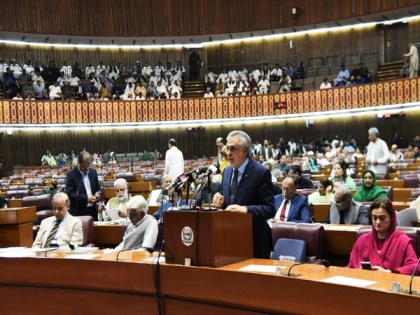Pakistan's new budget depends on concessions from China
By ANI | Published: June 13, 2023 02:31 PM2023-06-13T14:31:02+5:302023-06-13T14:35:11+5:30
Islamabad [Pakistan], June 13 : Staring at the rising risk of a sovereign default, Pakistan unveiled a PKR 14.5 ...

Pakistan's new budget depends on concessions from China
Islamabad [Pakistan], June 13 : Staring at the rising risk of a sovereign default, Pakistan unveiled a PKR 14.5 trillion (USD 50 billion) budget late last week, much of it to be funded by borrowing, Nikkei Asia reported.
While Finance Minister Ishaq Dar insisted the government had prepared a "responsible budget," experts and even officials are sceptical, warning that it may not help the country secure crucial support from the International Monetary Fund.
The country remains mired in political and economic crises, amid punishing inflation that neared 38 per cent in May. On Monday, the central bank left its benchmark rate unchanged at a record-high 21 per cent, saying it thinks inflation has "peaked."
But as it is stuck with only about a month's worth of foreign reserves, the nuclear-armed South Asian country home to over 230 million people faces a difficult road and may be forced to rely on top bilateral creditor China, Nikkei Asia reported.
Nikkei Asia is a pan-Asia News House, that brings news and insights on the region's most influential companies, and comprehensive coverage of politics, economy, markets and trends from an Asian perspective.
Pakistan's budget comes with a huge deficit of 7.5 trillion Pakistani rupees, to be financed with debt. The government plans to borrow USD 17 billion from banks in Pakistan and USD 8 billion from external sources.
But a Pakistani government official, who requested anonymity because he is not authorized to talk to the media, said that without an IMF deal, it will be virtually impossible for Islamabad to borrow the required amount in the coming fiscal year, Nikkei Asia reported.
Since November, Pakistan has been awaiting the completion of the ninth review of an IMF bailout package that would unlock over USD 1.1 billion. But time is running out as the agreement expires on June 30.
Pakistan would be borrowing simply to manage its debt load. About half the entire budget is to be spent on debt servicing, USD 22 billion for domestic debt and USD 3 billion for external debt, Nikkei Asia reported.
Mahfooz Ali Khan, a board member at the State Bank of Pakistan, told Nikkei Asia that under the new budget, Pakistan would be spending a significant chunk on nonproductive sectors.
"Almost the entire federal tax revenue, after deducting the share of provinces, will be spent on debt servicing," he said.
Finance Minister Dar signalled that the current government does not plan to seek a new deal with the IMF after the existing one expires on June 30, although Islamabad wants to complete the program, Nikkei Asia reported.
The budget documents reveal that Pakistan expects to receive USD 2.4 billion from the IMF, suggesting that the government is banking on completing the entire remaining Extended Fund Facility.
After unveiling the budget, Dar said the government is now looking at rescheduling bilateral debts, which make up 37 per cent of Pakistan's external obligations. That turns the spotlight on China, to which Pakistan owes USD 23 billion, according to the IMF's country report for 2022, Nikkei Asia reported.
China in the past has promised to help Pakistan, home to a USD 50 billion component of the Belt and Road infrastructure initiative, "stabilize" its economic crisis.
The government official who spoke anonymously said Islamabad expects Beijing to reschedule its debts and prevent a default, even if the IMF does not cooperate. Still, he conceded, "Currently, there is no indication that China will agree to Pakistan's request for rescheduling debt."
Dar insisted the budget was not designed with an eye on polls due later this year. But experts have called it an election budget nonetheless, as the government increased the salaries of civil employees by 35 per cent and boosted the monthly minimum wage to 32,000 rupees, Nikkei Asia reported.
The government has also allocated 1.1 trillion rupees for subsidies, 1.5 trillion for grants and 1 billion for health insurance for working journalists. All these steps are seen as means to woo voters and the press.
With Prime Minister Shehbaz Sharif's government blocking state elections amid a battle with predecessor Imran Khan, many have questioned the outlook for holding a national vote. The budget does include 48 billion rupees earmarked as election expenses, a strong indication that the government intends to hold polls within the year through next June, Nikkei Asia reported.
Pakistan's shrinking fiscal space has taken a toll on development outlays. The total federal development budget is 1.2 trillion rupees, or about USD 4 billion, hardly enough to meet the country's needs, especially after last year's devastating floods.
In the disaster, physical infrastructure suffered an estimated USD 14.9 billion worth of damages; there was another USD 15.2 billion worth of economic losses, according to the Pakistan Economic Survey 2022-23.
A board member at the State Bank of Pakistan, Mahfooz Ali Khan, said that not a single macroeconomic indicator shows any positive development, which means Pakistan's economy needs a massive injection of funds to recover, Nikkei Asia reported.
Far from guiding Pakistan out of its economic crisis, the budget has exposed the government's inability to run its affairs without massive borrowing. Although the IMF outcome remains to be seen, many believe the plan has set the stage for asking China for major concessions. Beyond whether Beijing would play ball, it is unclear what it would demand in return.
While questioning the budget's feasibility, experts say the only hope for progress is to resolve the festering political crisis, which has already spiralled into violence this year.
Disclaimer: This post has been auto-published from an agency feed without any modifications to the text and has not been reviewed by an editor
Open in app

